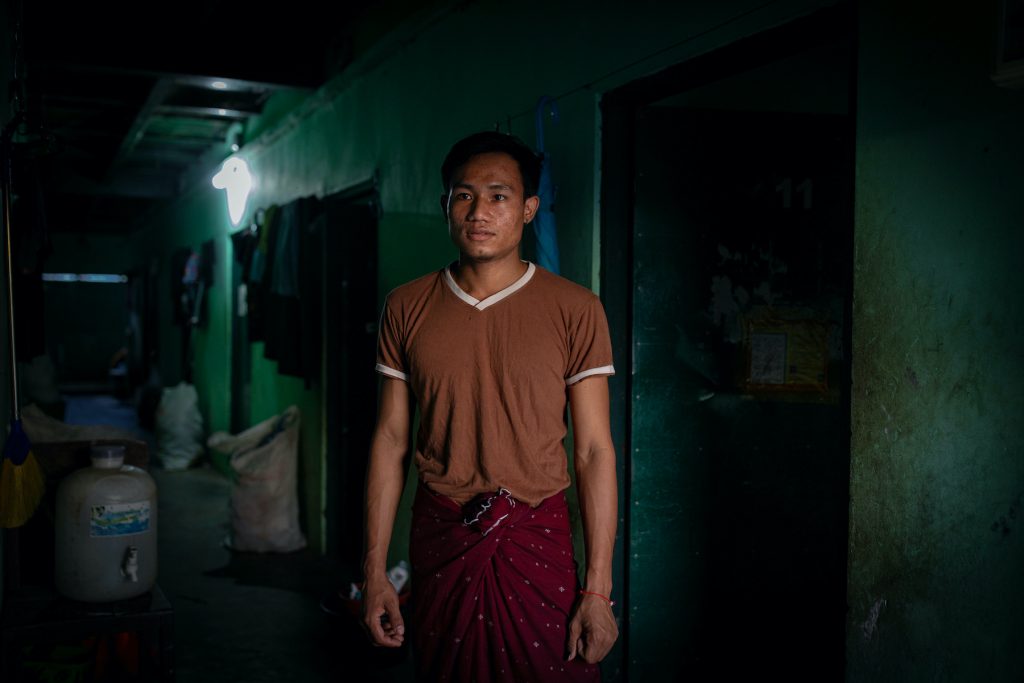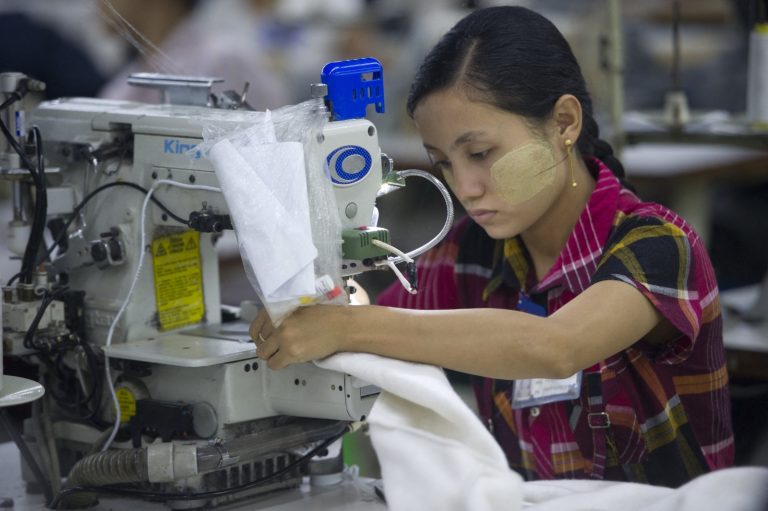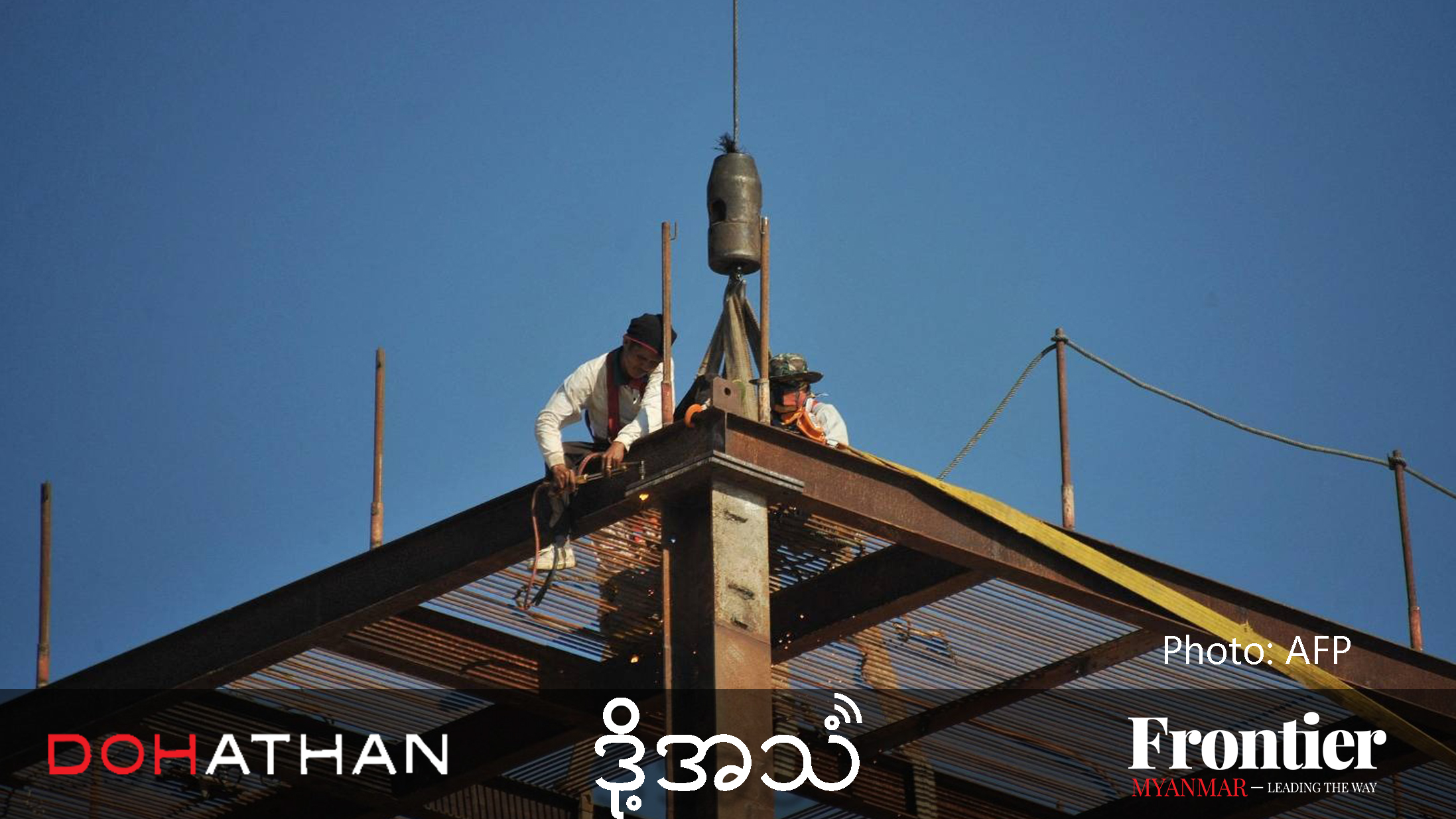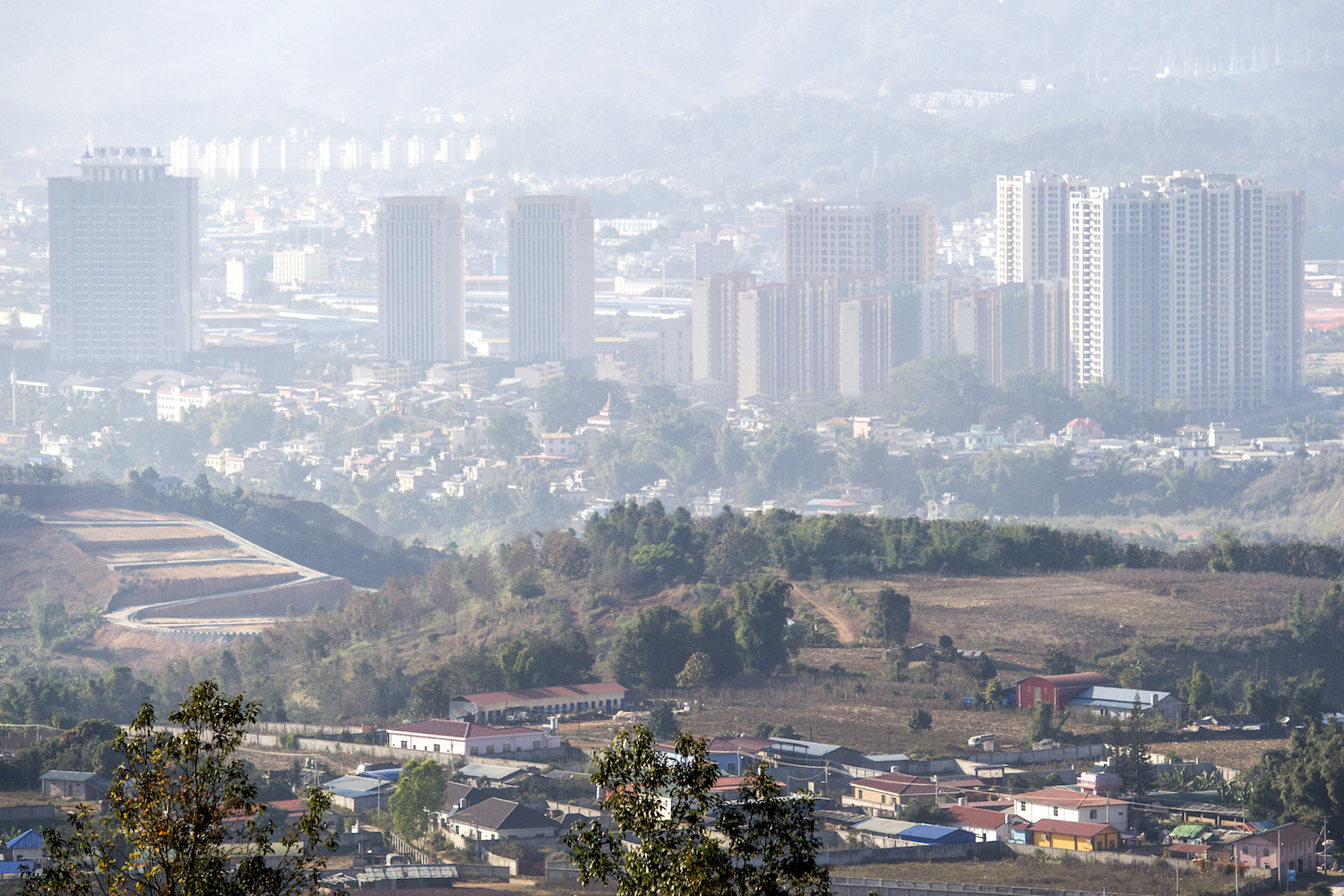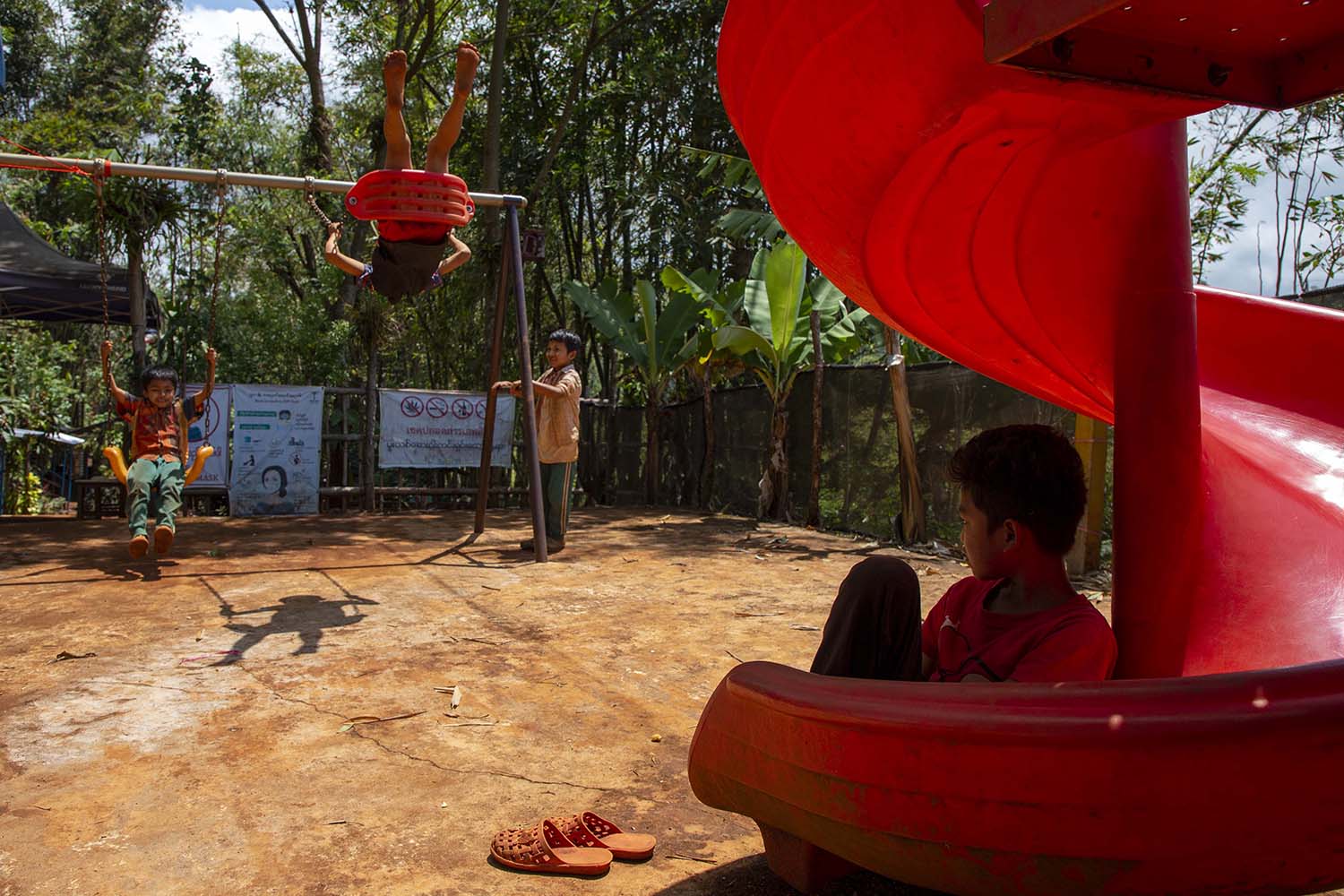Hundreds of thousands of workers in the garment sector are relieved to be back at work after enduring a miserable, desperate month in cramped hostels.
By PYAE SONE AUNG | FRONTIER
Ko Thant Zaw Win, 26, lies sprawled out on the floor, the dim overhead light illuminating the sweat glistening on his forehead. An unpleasant smell dominates the tiny space: too many people, too little ventilation.
The room is just nine feet on each side; there’s only enough space for the four beds. Thant Zaw Win and his three roommates have barely left the room in the past four weeks, since the government brought in strict stay-at-home orders for Yangon Region on September 21 to control the spread of COVID-19. Saung Shwe Nay, the factory at which Thant Zaw Win works, closed three days later.
Day after day in this uncomfortable environment with nothing to do except worry about the future – how he’ll pay the bills, when he’ll be able to go back to work – has left Thant Zaw Win anxious, and possibly depressed.
“I’ve been deeply unhappy but haven’t had any way to express it; all I could do was sigh out loud,” he said. “Thank you for asking how I’m feeling.”
He moved to this worker hostel because it was cheaper than his previous room; split four ways, the K70,000-a-month rent, including electricity, enables him to send back around K100,000 to his family in Bago Region’s Paungde Township.
Although they have electricity, residents at the hostel frequently endure shortages of running water. During Yangon’s lockdown, they’ve barely had a chance to wash their hands, let alone take a shower, Thant Zaw Win said. “I dare not complain though; I just have to put up with it. If I got kicked out of here I’d have nowhere to go and I can’t risk that at the moment.”
Hundreds of thousands of people have migrated to Yangon from rural areas in recent years to escape poverty and support their families. Most stay in overcrowded hostels similar to the one in which Than Zaw Win lives.
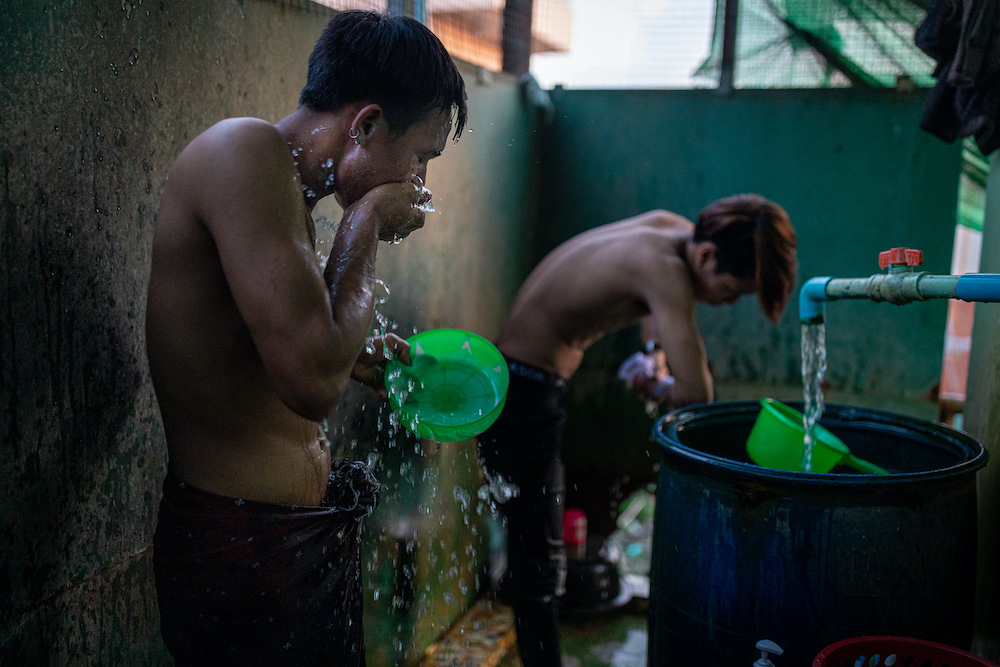
The buildings are typically three stories and are home to at least 100 workers. Anywhere from three to five people cram into each of the thinly partitioned rooms, where they cook, eat and sleep. There are usually just a handful of shared toilets and water taps.
The conditions are miserable enough when the workers are there just in the morning and evening, but the inability to go outside for weeks had made life unbearable. The closure of highway bus lines to stop the virus from spreading to other parts of the country made it impossible for most workers to return home temporarily until their factories could reopen.
Just as concerning for factory workers, though, are the financial implications of the shutdown. Ma Nu Nu Aung, 24, from Pyapon Township in Ayeyarwady Region, also works at Saung Shwe Nay. She earns around K230,000 a month, of which she typically sends around K60,000 back to her family.
But when the government ordered the factory to close in September, she was suddenly left without any income. When her landlord insisted that she still pay her rent on time, she had no choice but to ask her family for money.
“With no money and certainty, and trapped in these little rooms, it does funny things to you. I often thought about hurting myself, about beating my head in, during this stay-at-home period,” she told Frontier.
On October 14, both Nu Nu Aung and Thant Zaw Win were able to return to work. Although the Ministry of Health and Sports was still detecting close to 1,000 new cases in Yangon a day, the growing social and economic toll of the lockdown and the government’s inability to provide even the most basic support forced its hand.
But workers and unions have been upset at the government’s handling of the shutdown, saying it learned little from the earlier closure in April and May and inflicted unnecessary suffering due to mismanagement and poor communication.
The Ministry of Health and Sports had originally ordered factories to close from September 24 to October 7, meaning that most had not yet received their September pay. When the ministry on October 5 extended the shutdown to October 21, it sparked a wave of complaints and criticisms from desperate workers. The government then backtracked, and announced on October 10 that factories and workplaces deemed to have the best COVID-19 prevention measures, known as “A-level”, would be allowed to reopen in two days’ time.
Although some landlords agreed to delay rent payments until workers had received their salary, some were evicted at the end of September because they could not pay, said Ma Moe Sandar Myint, who leads the Federation of Garment Workers Myanmar. Many workers have taken on debts, she added. “To give you an example, one group of factory workers reported to us that they had no choice but to take loans from moneylenders with interest of 20 percent per month just to pay their rent,” she said.
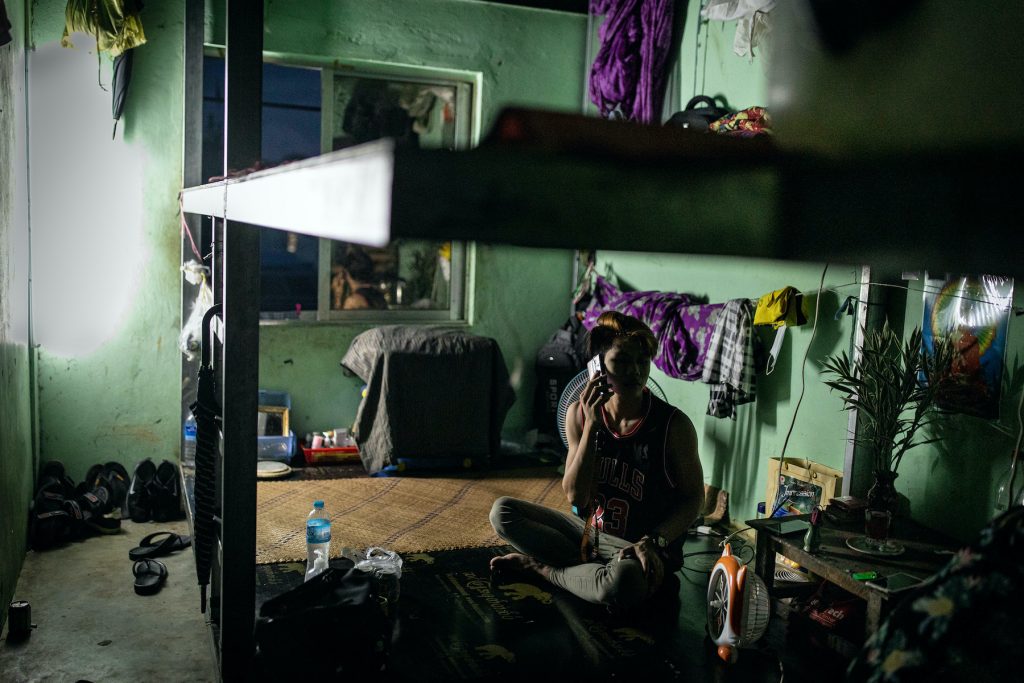
With paypackets for September and October lighter than usual – workers are not paid for the days they were forced to miss – many will be unable to send money back to their families, and may even have to borrow more, she said.
Unlike informal workers, most garment factory employees are registered with the government and eligible for some support. Although the government said it would cover 40pc of registered workers’ lost salary out of the Social Security Fund, the money is yet to arrive. It will also be calculated using their basic wage, which is usually less than two-thirds of total take-home pay.
To make matters worse, during the first shutdown, some factory managers misreported the basic salary of their workers to the Social Security Board, which manages the fund. Social Security Department director Daw Than Than Nu said that they instead reported 40pc of the basic salary for the unpaid days only, rather than 40pc of the total monthly basic salary.
Among those affected was Ma Tin Tin Wai, leader of the union at the Running Tex garment factory, who said she received only K9,000 for April despite being eligible for more than K50,000.
Tin Tin Wai spoke to Frontier on October 10 at a small camp she and union members had set up in front of their factory to demand the government resolve the “crisis” the shutdown was causing.
But even some factory owners have been highly critical of the government’s handling of the crisis. “They [the government] conducted no prior consultation with either factory owners or workers before or during this shutdown,” Ma Yin Yin Moe, owner of Hla Yin Moe garment factory, told Frontier on October 8. “The factories are likely to die if the shutdown continues.”
Already, she said, the shutdown had resulted in a significant drop in orders and buyers had temporarily stopped paying for goods. Yin Yin Moe claimed that the decline in revenues meant she had to dip into her savings just to pay workers for September. “The government never seems to anticipate the consequences, let alone help us to deal with them.”
The government’s October 10 statement, which allowed factories and other businesses with A-level COVID-19 prevention measures to reopen, said that while COVID-19 was still a major health threat in Yangon, it was important to allow businesses to operate as normal so that workers do not lose their jobs.
The announcement was a green light to many businesses to reopen – even those that had not passed inspections, or been given a less than A-level rating.
“The ferries are loaded with around 50 workers, who every morning and evening have to jostle to get through the crowd at the factory entrance,” said Nu Nu Aung. “There are just a few prevention measures in the workplace. The workers receive only three masks a week.”
Ko Thet Hnin Aung, general secretary of Myanmar Industry of Craft and Service said that many factories that received a “B-level” COVID-19 preparedness rating in May had resumed operations.
The Ministry of Labour, Immigration and Population has said factories not complying with health instructions will face charges under the Natural Disaster Management Law, but also suggested it wants to help factories raise their standard in order to be compliant.
“In order to encourage A-level prevention of COVID-19 in factories, we are going to organise internal audit [teams] that include representatives from workers and factory owners, HR managers and health staff,” Yangon Region Minister for Immigration and Human Resources, Daw Moe Moe Suu Kyi, was quoted as saying in an October 14 statement.
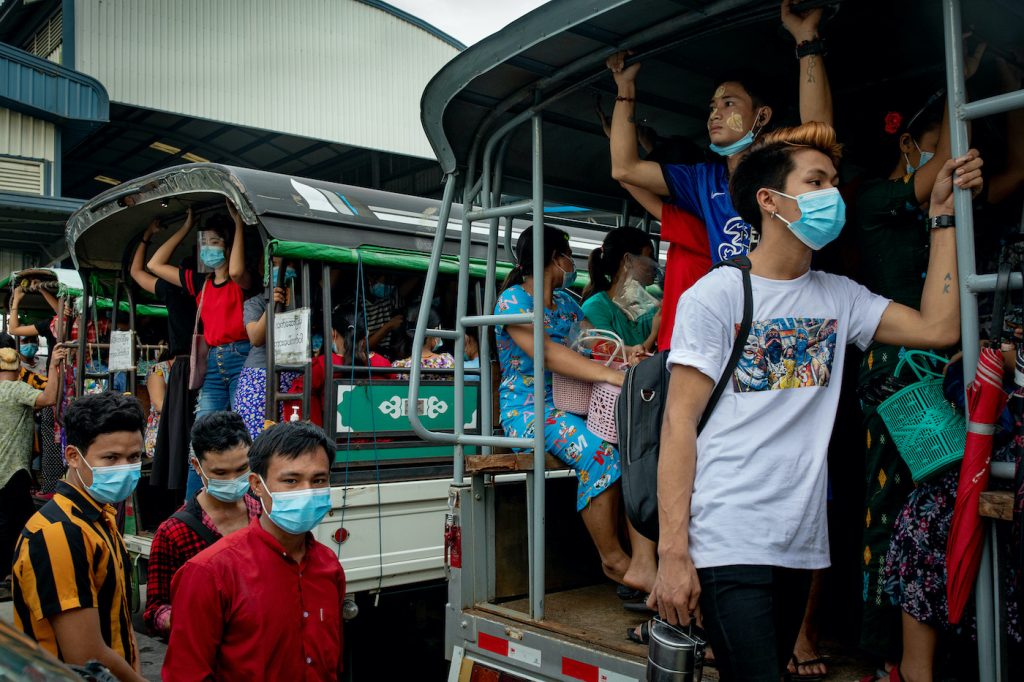
Workers said they are concerned about their safety, but see it as the lesser of two evils. At least now they can pay rent and maybe send some money back to their families, while also avoiding being locked in their cramped hostels.
“Right now,” said Nu Nu Aung, “we’re more worried about starvation and homelessness than being infected by COVID-19.”


